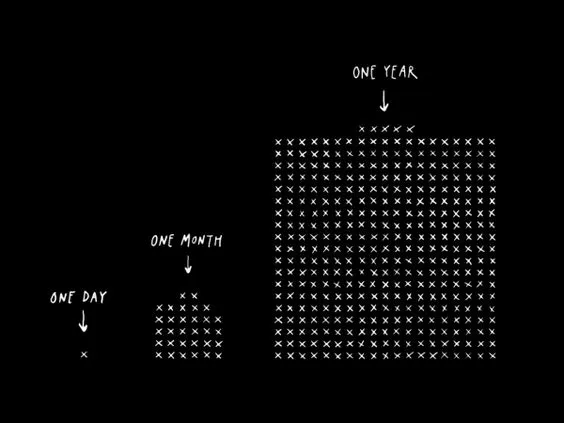t’s the ‘new year new me’ time and I am so glad to ask you — ‘How are you doing with those resolutions?’. Let me define resolution first.
The beginning of a new year embarks the start of something fresh. People take it as a sign to let go of things that went wrong in the previous year and embrace the coming times with open arms.

Broke up with your partner? Well, the new year will introduce you to new people. Had a bad year at school? It’s gonna be a tough climb but you’ll get your grades up. Have to search for a new job? They’re gonna line up for you.
Maybe, all these promises and resolutions and not about if those things would actually happen, but more about the positive energy that drives us to be a better version of ourselves. But each year I see friends, family members and peers — setting unrealistic pedestals for themselves and falling short within the first quarter. Is all the hassle for ‘resolutions’ actually necessary?
The science behind promises
Don’t want to hear me — that’s okay. Let’s look at some facts.
Studies show that around 80% of resolutions crash and burn by February. Why? Because resolutions often lack specificity, are fueled by societal expectations, and are burdened by the weight of perfectionism. The mind, being the crafty negotiator it is, convinces us that if we can’t do it flawlessly, why bother at all?
Gyms make the most money in January because everyone wants to get in shape. They take up months of advanced classes because “If I paid, I’ll probably be committed and go”. Spoiler alert — they don’t.
I agree — resolutions are there only to make you a stronger person, but they are just empty promises that people force you on. Until and unless you find motivation and purpose to accomplish the task, you’re not going to keep those resolutions — resulting in despair.
Now that we’ve seen that most resolutions break, let’s see why that happens. Not to generalise — but in most cases, people cannot adjust to their new routine. It looks something like
31st December: Eating carbs, rarely going to the gym, reading 5 pages a week, going out every day
1st January: I’m gonna eat only veggies, gym every day at 6 AM, and read 10 pages every day before sleep, it’s time to stay inside and focus on work.
Ideally — it’s a great approach.
Realistically — that’s not gonna happen (Unless you have a mind of iron).
We love routine. Our work is planned according to the time of day. Once you go and change every aspect of it, the mind is not gonna keep a balance.
When we abruptly toss in a resolution, it’s like telling our brain, “Hey, let’s flip our life upside down starting tomorrow!” Guess what? The brain, being the stubborn creature it is, responds with scepticism and a subtle eye-roll.

Why resolutions?
The allure of resolutions lies in their promise of a fresh start, a chance to reinvent ourselves. It’s the psychological clean slate phenomenon, a seductive notion that a new year equals a clean break from the old habits that haunt us. But here’s the catch:
The calendar changing doesn’t magically erase our ingrained behaviours.
Resolutions often lack specificity, are fueled by societal expectations, and are burdened by the weight of perfectionism. The mind, being the crafty negotiator it is, convinces us that if we can’t do it flawlessly, why bother at all?
What to do instead?
Instead of falling into the New Year resolution trap, consider a more holistic approach to personal development. Real change is a gradual, continuous process that requires self-reflection, small, sustainable adjustments, and a genuine desire for transformation.
Start Small: Let your mind and body adjust to those changes. When you throw a rock in water — it creates ripples. Similarly, when you throw a new habit into your routine, it is going to be accompanied by some chaos and unpleasant times. Take some time to calm down the waves.
Rather than attempting a radical overhaul, start with small, manageable changes. Build from there as these habits become ingrained in your routine.
Set Specific Goals: Define clear, achievable goals. Vague resolutions like “exercise more” or “eat healthier” lack the specificity needed for success. Instead, set goals like “walk for 30 minutes every day” or “eat a serving of vegetables with every meal.” When you add a number to the resolution, it makes it more achievable and doable.
Track Your Progress: Keep a journal or use apps to track your progress. When you do so, you’re not only creating a goal for the next day but also seeing your previous self grow gradually over time. For example, a year ago I decided to learn a new language using Duolingo.
I broke my streak a couple of times until I got serious. Now, I have a 1 year+ streak all because I know how far I’ve come. Seeing incremental improvements reinforces positive behaviour.
Stay Accountable: No one is coming to save you. It is your life and you make the choices. No one will wake you up to start a business or get good scores. Only when you picture a better future for yourself and respect your coming years, you can stay accountable.
Celebrate Small Wins: Acknowledge and celebrate your achievements along the way. Recognizing progress, no matter how small, keeps motivation high. You read for a week straight? Awesome. Did you go to the gym 3 times this week? I’m proud of you.
Make sure you don’t compare your goals to those of other people. Different people walk on different paths, you choose the one that’s suitable for you.

So, here’s a revolutionary idea: ditch the resolutions, embrace your quirks, and focus on being the best version of yourself year-round. After all, change isn’t confined to a date on the calendar — it’s a constant, ever-evolving journey. Save yourself the charade, and let the real transformation begin. Cheers to a resolution-free, authentically transformative year!